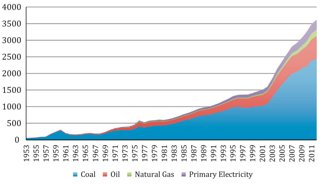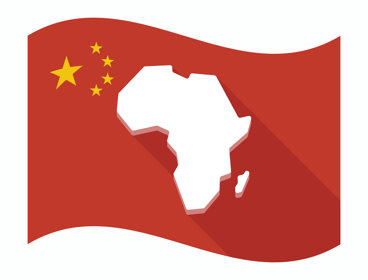Guy C.K. Leung is a Visiting Scholar at Oxford University's China Centre. We spoke to Guy about energy consumption and energy policy in China.
Now that China’s economy has grown to become one of the biggest in the world, how has China’s energy consumption and composition changed?
These are actually two different but highly related questions. China started its open door policy and economic reform in 1978. China overtook the US to be the world’s largest energy consumer in 2010. Between 1978 and 2010, the country’s energy demand has grown by almost 7 times. Put differently, British energy consumption levels were 53 percent of China’s in 1978 but only 9 percent in 2010. But you are right that what is relevant here is the composition of China’s energy consumption, because, conceptually speaking, if Chinese society was running entirely on domestic renewable energies, the “China Factor” should have been less relevant or alarming. Over the last three decades, China’s energy transition has been moving towards a lower carbon economy: less coal and oil, more gas and a lot more renewables. But the transformation is slower than we want it to be. In 2012, coal, the dirtiest form of energy, still accounted for nearly 70% in China’s fuel mix (compared to around 30% in the UK and around 20% in the USA). The low(er)-carbon fuels, including gas, non-hydro renewable and nuclear energies, remain relatively marginal. 

China’s Primary Energy Consumption by Type, 1953-2012, Mtce
Source: Leung, G.C.K. et al., 2014. Securitization of energy supply chains in China. Applied Energy, 123, pp.316–326.
What has driven these changes?
Drivers of China’s energy demand growth include economic growth, rise of the middle class, heavy industrialisation and urbanisation. China’s heavy dependence on coal has created some big problems, both environmental and social. Plagued by simmering summers, choking smog and unsettling blackouts, Chinese government and citizens taste the unintended consequences of unsustainable development in a physical way. Great efforts have been put in to reduce coal consumption over the last decade. But adjusting the fuel mix of a country with its energy needs still growing fast is not easy, and we expect that the transition will be gradual instead of dramatic. But there are some exciting top-down and bottom-up forces at work to alleviate the “coal problems”. I can say the Chinese are extremely motivated. While global climate change could still be abstract to many Chinese, the local air and water pollution is lethally conspicuous in their everyday lives.
Does China get most of its energy from domestic supplies, or does it have a lot of imports?
We can still say that China is still largely self-sufficient with energy supplies, because of its rich coal endowment. The exception is oil: now about 60 out of 100 barrels of oil they consume are imported from a range of countries. Their gas import is climbing fast too. This trend will go on, unless, for example, they can find a way to tap into their enormous unconventional oil and gas. But large-scale commercial production of these resources is unlikely before 2020.
Why is energy security so important in China?
Energy security is defined as the continuity of “vital energy systems” (VES), which are those energy supply-chain systems that underpin the continuity of a country’s society, economy and military. For example, oil is a classical VES, as it has fewer alternative fuels in transport and military. So I think energy security is important to any countries, but those that need to heavily rely on foreign energy sources, such as China, would be more anxious about it.
Why are energy policies in China important for the global energy system?
Simply because it is now the largest energy consumer and carbon emitter. During 2005-2010, the country contributed to 62% of global energy demand increase, 65% of global oil demand increase, and 91% of global coal demand increase. I recently came back from a meeting organised by Oxford Institute of Energy Studies and UK Energy Research Centre. I learned that the rebound in coal consumption in the UK in the last couple years was simply because of the global coal price decline, which resulted partly from the weakened coal demand by China.
Does China use a lot of renewable energy resources and is this changing?
Yes, China does use a lot of renewable energy resources, especially hydro-electric power. Since the mid-2000s, there has been an investment boom of non-hydro renewable energies, namely wind, solar and biomass. A recent UN report also suggests that China is a global leader in this field and has accounted for one-fifth of the world’s total investment in renewables. China’s goal is to have 20 percent of its total energy demand sourced from non-fossil energies by 2020, the same as the UK’s target for 2020.

Electricity Production from Non-coal Sources in China 1971–2010, kWh/year
Source: Leung, G.C.K. et al., 2014. Securitization of energy supply chains in China. Applied Energy, 123, pp.316–326.
Is China trying to become a lower carbon, cleaner economy? If so how is it doing this?
Yes, it is. I think there are supply-side and demand-side measures. On the supply side, investment in lower carbon energies, including renewable energies, natural gas and nuclear (which is more debatable). On the demand side, while it is not quite possible to stop China’s energy consumption from growing, as long as its economy is still expanding, we want the economy to grow in a more sustainable way: Replace old buildings and equipment with energy-efficient ones. Adjust the economic structure. Enforce tougher environmental laws. Promote energy-saving culture. The Chinese have been doing it with exciting results, but there are still so much more to be done.
How did you get involved in researching energy in China?
It all started when I did my undergraduate degree in Hong Kong a decade ago. As a final year student, I was required to spend a year doing research and writing a thesis. I quickly found doing research and talking ideas that matter extremely fulfilling. The moment I submitted my thesis, I knew that I wanted more of this feeling. So I applied for a master degree at the same institute. While preparing my research proposal, I decided to study China’s energy, partly because I loved this topic, and partly because this topic was globally marketable. Being in the energy community also enables me to meet a lot of very bright people from different backgrounds — economists, bankers, politicians, diplomats, journalists, engineers and lawyers. In hindsight, I am glad to say that I was right.
How do you go about finding data for your research?
Secondary data come from domestic and international statistics. Sometimes my university libraries have subscribed to some very detailed databases. But as a geographer, I am more interested in people. So my research also relies on primary data, which is collected via semi-structured interviews. For example, my current research project on China’s natural gas transition has allowed me to talk to about 50 colleagues from the Chinese government, national and international oil companies, and non-governmental organisations. With their sharing, I got to have some sense of “how it actually works” in reality. Sometimes, my interviews became my lifelong mentors and friends.
What is the most challenging part about conducting research on energy in China?
I think the most challenging part is that it is not easy for young researchers to obtain access to energy leaders from the government or enterprises. It is especially true for those who do not speak fluent Mandarin Chinese, or are unfamiliar with the social norms. For example, you are not supposed to jot notes or use audio recorders during interviews, or you would put your interviewees off, or even offend them.
What has been the most rewarding moment in your research career?
There have been many miraculous moments. Let me share with you the latest one. I attended a conference in London early this year, and I spotted a scholar whose works I really admire. I wanted to get myself introduced to him, but I was a bit too shy to take action. While I was still trying to conjure up some courage, this gentleman came to me and said, “Are you Guy? I’ve read your works. Well done!”
Guy received doctoral training in human geography at Durham University. He has published over 20 peer-reviewed articles on a range of China's energy problems, and is now editing a book on China's energy security, which will be published by Routledge in 2015. He has worked for the Chinese University of Hong Kong and King's College London. In September 2014, he will join the Geopolitics of Energy Project at Harvard University's Kennedy School of Government.
Guy was interviewed in June 2014




